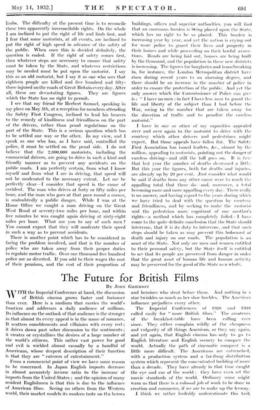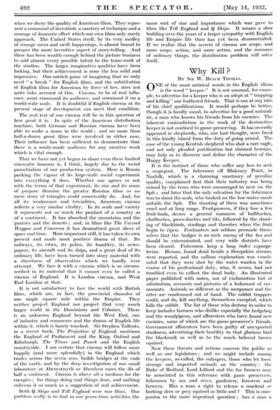The Future fo r British Films
By JOHN
GRIEKSON ITH the Imperial Conference at hand, the discussion T of British cinema grows faster and furiouser than ever. Here is a medium that carries the world's frontiers and addresses a daily audience of millions. Its influence on the outlook of that audience is the stronger in that almost its every appeal is in the name of romance. It scatters ennoblements and villainies with every reel; it drives down past sober discussion to the sentiments ; it creates or crystallizes the desires of a large number of the world's citizens. This rather vast power for good and evil is wielded almost casually by a handful of Americans, whose deepest description of their function is that they are " caterers of entertainment."
From a commercial point of view we have some reason to be concerned. In Japan English imports decrease in almost accurately inverse ratio to the increase of imports from the United States ; and the opinion of many resident Englishmen is that this is due to the influence of American films. Seeing no others from the Western world, their market models its modern taste on the heroes
and heroines who strut before them. And nothing in a star twinkles so much as her slaw biwkles. The American influence prejudices every other.
The Imperial Conferences of 1026 mid 1930 called easily for " more British films." The amateurs of the breakfast-table have been calling ever since. They either complain wildly of the cheapness and vulgarity of all things American, or they say again, and yet again, that English cinema has only to go to English literature and English scenery to conquer the world. Actually the path of cinematic conquest is a little more difficult. The Americans are entmnehed, with a production system and a far-flung distribution system which represent the concentrated building of mom than a decade. They have already in that time caught the eye and ear of the world : they have even set the movie standards of the world. Ordinary sense might warn us that there is is colossal job of work to be done in creation and commerce, if we arc to make up the leeway.
I think we rather foolishly underestimate this task when we decry the quality of American films. They repre- sent a command of inventioh, a mastery of technique and a courage of dramatic effect which our own films only rarely approach. The United States itself, by its very medley of strange races and swift happenings, is almost bound to prosper the more inventive aspect of story-telling. And there has been wealth enough behind the picture business to add almost every possible talent to the team-work of the studios. The larger imaginative qualities have been lacking, but their achievement is none the less solid and impressive. Our ostrich game of imagining that we only need "a break" for English films, and the substitution of English films for American by force of law, does not quite take account of this. Cinema, to be of real influ- ence, must command- its audience, and command it on a world-wide scale. It is doubtful if English cinema at its present stage of development can meet that condition.
The real test of our cinema will lie in this question of how good it is. In spite of the American distribution machine, both German and Russian cinema have been able to make a name in the world ; and no more than half-a-dozen great films were involved in either case. Their influence has been sufficient to demonstrate that there is a ready-made audience for any creative work which is vital enough.
That we have not yet begun to share even these limited cinematic honours is, I think, largely due to the weird parochialism of our production system. Here is Russia packing the vigour of its large-scale social experiment into everything it does. Whether one agrees or not with the terms of that experiment, its size and its sense of purpose illumine the greater Russian films as no mere story of triangles could conceivably do. And, for all its weaknesses and trivialities, American cinema reflects a very similar vitality. In its scale and variety it represents not so much the product of a country as of a continent. It has absorbed the mountains and the = prairies and the deserts ; and, in films like The Covered Waggon and Cimarron it has dramatized great slices of space and time. More important still, it has taken its own present and made most positive drama of that. Its railways, its cities, its police, its banditry, its news- papers, its aircraft and its ships, and a great deal of its ordinary life, have been turned into story material with a directness of observation which we hardly ever attempt. We face it with a cinema which is so circum- scribed in its material that it cannot even be called a cinema of England. It is London cinema, and West End London at that.
It is not satisfactory to face the world with British films, which are, in fact, the provincial charades of one single square mile within the Empire. They neither project England nor project that very much larger world in the Dominions and Colonies. There is an unknown England beyond the West End, one of industry and commerce and the drama of English life within it, which is barely touched. Sir Stephen Tallents; in IL recent book, The Projection of England, mentions the England of Parliament and the King, Oxford and Edinburgh, The Times and Punch and the English countryside. I am certain that cinema will follow more happily (and more splendidly) in the England which trades across the seven seas, builds bridges at the ends of the earth, and by the deep investigation of one small laboratory at Aberystwyth or Aberdeen cures the ills of half a continent. Cinema is above all a medium for the energies : for things doing and things done, and nothing enlivens it so much as a suggestion of real achievement.
Both Q Ships and Tell England were war films. Our problem really is to find in our peace-time activities the
same sort of size and importance which war gave to films like Tell England and Q Ships. It means a slow building over the years of a larger sympathy with English life and Empire life than has yet been demonstrated. If we realize that the secrets of cinema are scope, and more scope, action, and more action, and the romance of ordinary things, the distribution problem will solve itself.





































 Previous page
Previous page